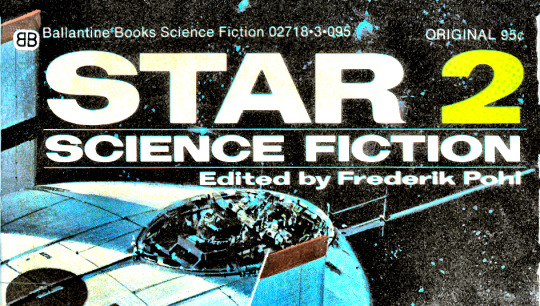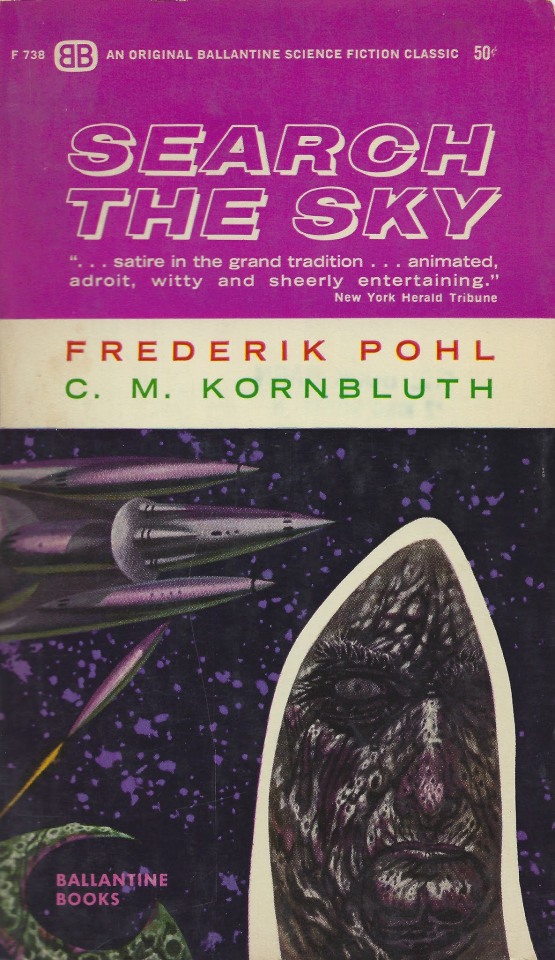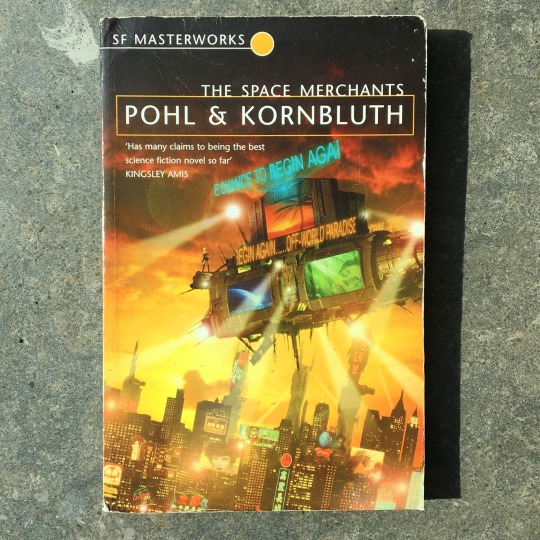#c. m. kornbluth
Explore tagged Tumblr posts
Text

A book you very likely don’t have on your shelf #616
Cover by Ed Emshwiller -- 1955
#1955#1950s#1950's#frederik pohl#c. m. kornbluth#fiction#flood#cover art#book cover#paperback#vintage paperback#vintage illustration#humour#ephemera
12 notes
·
View notes
Text

Cover illustration by Hoot von Zitzewitz
#hoot von zitzewitz#future tense#paperback#paperbacks#cover art#illustration#illustrations#book#books#book cover#book covers#1960s#60s#scifi#sci fi#science fiction#anthology#richard curtis#isaac asimov#robert a. heinlein#robert a heinlein#j. g. ballard#hugo gernsback#arthur c. clarke#c. m. kornbluth#murray leinster#dell books#arthur c clarke
0 notes
Text
RETRO REVIEW –STAR SCIENCE FICTION #2 (1954)
Figure 1 Srar Science Fiction #2 Cover by John Berkey I had planned to review the British (Sky) science fiction series, The Lazarus Project, now about to enter Season 2, for this week; it’s pure SF with only a minimum of technobabble (just enough to enable the premise), but I think I’ll need to devote a lot of thought to how one can review a continuing series without entirely spoiling the whole…

View On WordPress
#"Upstairs#“The Marching Morons”#“The Seventh Victim”#$7.99 (CDN)#A.J. Budrys#Alfred Bester#Amazon.ca#Anthony Boucher#Ballantine Books#Bill Mumy#C. M. Kornbluth#Column 372#copyright 1954#Darker Than You Think#David Duncan#Downstairs"#Downton Abbey#Due South#E.E. Doc Smith#Eight Keys to Eden#Famous Monsters of Filmland#Fletcher Pratt#Forrest J. Ackerman#Frederik Pohl#Galactic Derelict#Groff Conklin#Hal Clement#Harry Stubbs#J. Francis McComas#Jack Williamson
0 notes
Text

Variant cover art by Ken Barr (1976) for "Wolfbane" by Frederik Pohl and C. M. Kornbluth.
#ken barr#wolfbane#frederik pohl#c m kornbluth#sci fi#sci fi art#sci fi book art#sci fi cover art#retro sci fi#retro science fiction art
4 notes
·
View notes
Text

Art by John Berkey for Gladiator at Law by Frederick Pohl and C. M. Kornbluth (1969)
288 notes
·
View notes
Text
Space Dreadnoughts by Dave Drake
Space Dreadnoughts is a Military Science Fiction anthology by David Drake, Martin H Greenberg and Charles G Waugh. The contents in order of appearance are:
"Introduction: A quick Look at Battle Fleets" by David Drake
"The Only Thing We Learn" by Cyril M. Kornbluth
"C-Chute" by Isaac Asimov
"Allamagoosa" by Eric Frank Russell (won the Hugo Award for bestshort story in 1955)
"A Question of Courage" by J. F. Bone
"Superiority" by Arthur C. Clarke
"Hindsight" by Jack Williamson
"The Last Battalion" by David Drake
"Shadow on the Stars" by Algis Budrys
"Time Lag" by Poul Anderson
The first Military Sci Fi story I remember is the Star Trek TOS episode "Balance of Terror," in which Enterprise duels with a Romulan interloper. The military conflict was setting to other conflicts between the crew, the story was full of suspense, and actual battle was a small part of the story. And so it is here.
The book's title is a misnomer. The back cover blurb is misleading-- "Massive and arrogant, they patrol the final war zone-- deep space. All great battleships before them-- . . . are mere toys in comparison." It goes on about "bristling artillery" and "battalions of souldiers." I expected fleet actions involving capital ships. Tactics. Maneuvers. Gunplay. While there are fleet actions and even battleships in some of these stories, they are mere backdrops on a stage where people play out the stories. Truly good Science Fiction involves people, and in all these stories, the people overshadow the military settings that serve only to bring out the characters and whatever lessons there are to be learned from them. All of these stories are well worth reading.
"Introduction: A quick Look at Battle Fleets" Mr Drake's introduction is a wonderful introspective about the history of the Dreadnought battleships with a mention of two 1950's Astounding essays on the armaments of spaceships-- one by Willy Ley, the other by Malcolm Jameson. If one is going to write stories about ship-to-ship combat, the introduction is a good starting point. But only a starting point. One should definitely read Mahan, and consider the lessons of Taranto and Pearl Harbor. And the US Navy's Harpoon's and Tomahawk's are wonderful arguments in favor of missles over guns. One should also consider the time honored techniques of ramming and boarding actions.
Perhaps the question of guns vs missles is mooted today. The arms race has continued in Sci-Fi beyond what could be imagined with a knowledge of 1950's physics. The Ley and Jameson essays were written before Empire of Man fighters raked Formoria, before rail guns, and CTD imploders, before GRASER's, X-ray LASER's and phaser banks, before the Moties bombarded Mote Prime with asteroids, and before Captain Sheridan laid a gigaton on Z'ha'dum.
"The Only Thing We Learn" Kornbluth tells a cautionary tale of faded Imperial glory. The barbarians at the gates will one day have descendants that are as decadent and prissy as the effete and ineffectual empire they deposed and replaced. History blurs and magnifies the epic tales of glory. The details are lost. The character is lost. One day a fresh wave of barbarians sweeps aside succcessors that their ancestors would be ashamed to acknowledge. The reader may decide what relationship if any there is between this story and the quote from Friedrich Hegel. A fun story despite the dire consequences for the past and future losers. In his column, "Rereading Kornbluth", Robert Silverberg calls The Only Thing We Learn, "a subtle, oblique, elliptical, sardonic piece of work."
"C-Chute" Dr. Asimov wrote this story in 1951. It is a psychodrama set aboard a passenger ship taken as a prize by a race of chlorine breathers in Earth's first intersteller war. Each of the passengers is sketched by Asimov to reveal their several flaws of personality, physicality or character. Each has reasons why he should not exit the cabin via the C-chute, EVA, and enter and retake the control room from outside the ship. The reason for the dubious hero to take the heroic action required to retake the ship is one unlikey to appear in the work of any author but Dr. Asimov.
"Allamagoosa" This story won the 1955 Hugo for best short story. It's a farcical look at officious bureaucracy of the greatest gravity. It's sort of a shaggy dog story, wink, wink. This story in and of itself is worth buying the book for. The build up and so obvious in hindsight ending is fresh enough to be as enjoyable today as it was then.
"A Question of Courage" Sometimes flair and heedless risk taking can be mistaken for true personal courage. When the genuine article appears, there's no mistaking it. Bone craftliy deveops his characters and sets the reader up for the old maidish Captain "Cautious Charley" Chase of Lachesis to reveal his true nature. It is available from Project Gutenberg.
"Superiority" Sir Arthur requires no introduction for this story, a reductio ad absurdum about the principle of Illusory Superiority. Technology and bedazzlment with the latest, most theoretically wonderful advances are no substitutes for common sense and sound military doctrine. Perhaps this should serve as a cautionary tale at a time when Iraqi insurgents hack into our drones. According to Wikipedia, this gem was required reading at West Point. The reader easily empathizes with the narrator and his plight, revealed at the end.
"Hindsight" Jack Williamson has won both the Nebula and the Hugo Awards, and had a career that spanned about seventy years. This story involves temporal mechanics and love, oppression and liberation, and meeting engagements. Incidentally, the guns employed by the Astrach's fleet are of 20-inch caliber and fire four salvos per second. It's a tightly written story, though I think the ending is a little drippy.
"The Last Battalion" Imagine that Hitler did not die in a bunker in Berlin, but escaped via U-Boat to a secret Waffen-SS base in New Swabia. There German scientists built flying saucers from which they reached the moon to to mine aluminum and build more flying saucers. Now imagine them getting into a war with aliens. With things not looking so good, they kidnap a US Senator to let him know what is going on, intending to drag the US into the conflict. Before they can get where they're going with the Senator, the aliens lay a nuke on their Antartic base. They drop the Senator off to find his own way home. He asks them what they will do. Their colonel replies, we are SS-- we will fight.
"Shadow on the Stars" Budrys's Farlans are felinoid aliens who at first blush look like humans in cat suits. But they are, on a closer look, "raving paranoid quote." The paranoia is pathological and eventually fatal for Farla-- any military leader with sufficient ability to be effective cannot be trusted by Farla's rulers, and will be killed at the earliest sign of that fatal disease, military competence. The story is a retrospective, the central character telling how he and Farla came to be in their present straits. It is too late for him to convey the warning against trusting Earth, and to late to avoid the inevitable dissolution of Farla.
I have a problem accepting the plot device Budrys uses to set up the narrative, but otherwise the story is interesting and fun to read. The prose is a bit over decourous and affected, but that brings out the effeteness and pretentiousness of the Farlan culture. At the start, the Farlans are hard-pressed by a barabarian culture, the Vilk, and need a strong, capable leader to drive them back. OF course the strong, capable leaders keep their heads down so has not to find themselves assassinated by the Ministry of Preparedness-- and then comes L'Miranid. A previously unknown reservist, he quickly dominates the Fleet and whips them into shape. Victory follows victory until the Vilk host is driven back, their subject planets pounded to rubble, and a Farlan imposed king seated upon their throne.
The real story action is not fleet engatgements and daring raids, though. The story is related by Henlo, one of those capable leaders who has balanced command of a capital ship wtih avoiding notice by the governmental hunters down of competence. He starts the story as having a clear understanding of Farla's problems and the steps necessary to remedy them, but can't afford to be noticed. He becomes L'Mararind's aid, admirer, vice-admiral, intended assasin and successor, and finally, his unwilling co-conspirator and successor. Unwilling to be assasinated himself, he seizes control of the Farlan government. By this time, the sad (for Farla) truth is known to him, but (I love Latin quotes.) "alea jacta est." This is a fine little story with a lovely twist toward the end.
"Time Lag" Poul Anderson has won both the Hugo and Nebula Awards. Time Lag is a study in contrasts-- evil, greedy invaders against noble, selfless defenders. Chertkoi is a heavily overpopulated industrial planet, drowning in pollution and resource starved. Vaynamo is pristine, with a population sustainable through resource management. Vayanmo is never the less technologically advanced, with the technology's goal as preservation rather than exploitation. Expolitation is the name of Chertkoi's game. It's people conquer other worlds to fuel the industrial fires that smother their world under a cloud of pollution.
The archetype of the Chertoi is the Admiral commanding the invasion fleet. He is matched against the story's view point character, Elva. Elva is the widow of a Vayanmoan noble and prisoner of the Admiral. He is gross, vulgar and uncouth. She is pretty, cultured and well-mannered. He is a love struck boor, hopelessly smitten by her. She subtly endures his presence to manipulate him so that she an return herself and the other captives to Vayanmo in a portrayal that is believable and sympathetic. The invasion is a leveraged takeover in three stages-- a scouting raid, a strategic strike to destroy what little industry the Vayanmo posses, and a full-scale invasion. The title relativistic time lag (fifteen years) gives the Chertkoi time to build their invasion fleet and the Vaynamo time to prepare their reception.
References
Space Dreadnoughts by Dave Drake. Philipp Michel Reichold. JUL 19TH, 2017
Space Dreadnoughts. ed. David Drake, Martin H. Greenberg, Charles G. Waugh. July 1990.
Star Trek. "Balance of Terror."
The Mote in God's Eye. Jerry Purnelle and Larry Niven.
Various Polity universe stores. Neal Asher.
Babylon 5. "Z'ha'dum"
The Battle of Sauron. John F. Carr and Don Hawthorne.
0 notes
Photo

Search the Sky by Frederik Pohl and C. M. Kornbluth, cover by Richard Powers (1963)
#1960s#richard powers#richard m. powers#frederik pohl#c. m. kornbluth#Ballantine Books#paperback#vintage#book#science fiction#classic#search the sky#spaceship
48 notes
·
View notes
Photo

John Berkey, cover art for The Space Merchants by C. M. Kornbluth and Frederik Pohl (Ballantine Books edition, 1969).
#science fiction#book#cover art#John Berkey#The Space Merchants#C. M. Kornbluth#Frederik Pohl#USA#1969
217 notes
·
View notes
Text

A book you very likely don’t have on your shelf #578
Cover by Charles Binger -- 1953
#1953#1950s#1950's#Charles Binger#cover art#book cover#paperback#vintage paperback#science fiction#scifi#sci fi#sci-fi#ephemera#illustration#c. m. kornbluth
10 notes
·
View notes
Video
youtube
The Altar at Midnight ♦ By C. M. Kornbluth ♦ Science Fiction ♦ Full Aud...
0 notes
Text
Uncle Frank never let that word ‘citizens’ pass without a tirade. “We are not a government!” he always yelled. “We are not a government! We must not think like a government! We must not think in terms of duties and receipts and disbursements. We must think in terms of the old loyalties that bound the Syndic together!” Uncle Frank was sedentary, but he had roused himself once to the point of wrecking a bright young man’s newly installed bookkeeping system for the Medical Center. He had used a cane, most enthusiastically, and then bellowed: “The next wise guy who tries to sneak punch-cards into this joint will get them down his throat! What the hell do we need punch-cards for? Either there’s room enough and doctors enough for the patients or there isn’t. If there is, we take care of them. If there isn’t, we put ‘em in an ambulance and take them someplace else. And if I hear one God-damned word about ‘efficiency’ -” He glared the rest and strode out, puffing and leaning on Charles’ arm. “Efficiency,” he growled in the corridor. “Every so often a wise guy comes to me whimpering that people are getting away with murder, collections are ten per cent below what they ought to be, the Falcaro Fund’s being milked because fifteen per cent of the dough goes to people who aren’t in need at all, eight per cent of the people getting old-age pensions aren’t really past sixty. Get efficient, these people tell me. Save money by triple-checking collections. Save money by tightening up the Fund rules. Save money by a nice big vital-statistics system so we can check on pensioners. Yeah! Have people who might be working check on collections instead, and make enemies to boot whenever we catch somebody short. Make the Fund a grudging Scrooge instead of an open-handed sugar-daddy - and let people worry about their chances of making the Fund instead of knowing it’ll take care of them if they’re caught. Set up a vital-statistics system from birth to death, with numbers and fingerprints and house registration and maybe the gas chamber if you forget to report a change of address. You know what’s wrong with the wise guys, Charles? Constipation. And they want to constipate the universe.”
C. M. Kornbluth, The Syndic
5 notes
·
View notes
Photo

1987 cover art by Isidre Monés for ‘Our Best: The Best of Frederik Pohl and C. M. Kornbluth’
778 notes
·
View notes
Text

Frederik Pohl & C. M. Kornbluth: The Space Merchants (1953)
0 notes
Photo

Adrian Chesterman’s 1979 cover to Wolfbane, by C. M. Kornbluth... https://ift.tt/A9a62r8
4 notes
·
View notes
Text
She watched it disappear below her and sighed. She would never see the V.F.D. headquarters in all its glory. None of the Baudelaires would. Violet would never know how it felt to cook in the kitchen and gaze at the two tributaries of the Stricken Stream, while chatting with the other volunteers. Klaus would never know how it felt to relax in the library and learn all of the secrets of V.F.D. in the comfort of one of the library's chairs, with his feet up on one of the matching V.F.D. footstools. Sunny would never operate the projector in the movie room, or practice the art of the fake mustache in the disguise center, or sit in the parlor at tea time and eat the almond cookies made from my grandmother's recipe. Violet would never study chemical composition in one of the six laboratories, and Klaus would never use the balance beams at the gymnasium, and Sunny would never stand behind the counter at the ice cream shop and prepare butterscotch sundaes for the swimming coaches when it was her turn. And none of the Baudelaires would ever meet some of the organization's most beloved volunteers, including the mechanical instructor C. M. Kornbluth, and Dr. Isaac Anwhistle, whom everyone called Ike, and the brave volunteer who tossed the sugar bowl out the kitchen window so it would not be destroyed in the blaze, and watched it float away on one of the tributaries of the Stricken Stream. The Baudelaires would never do any of these things, any more than I will ever see my beloved Beatrice again, or retrieve my pickle from the refrigerator in which I left it, and return it to its rightful place in an important coded sandwich.
-- the slippery slope
1 note
·
View note